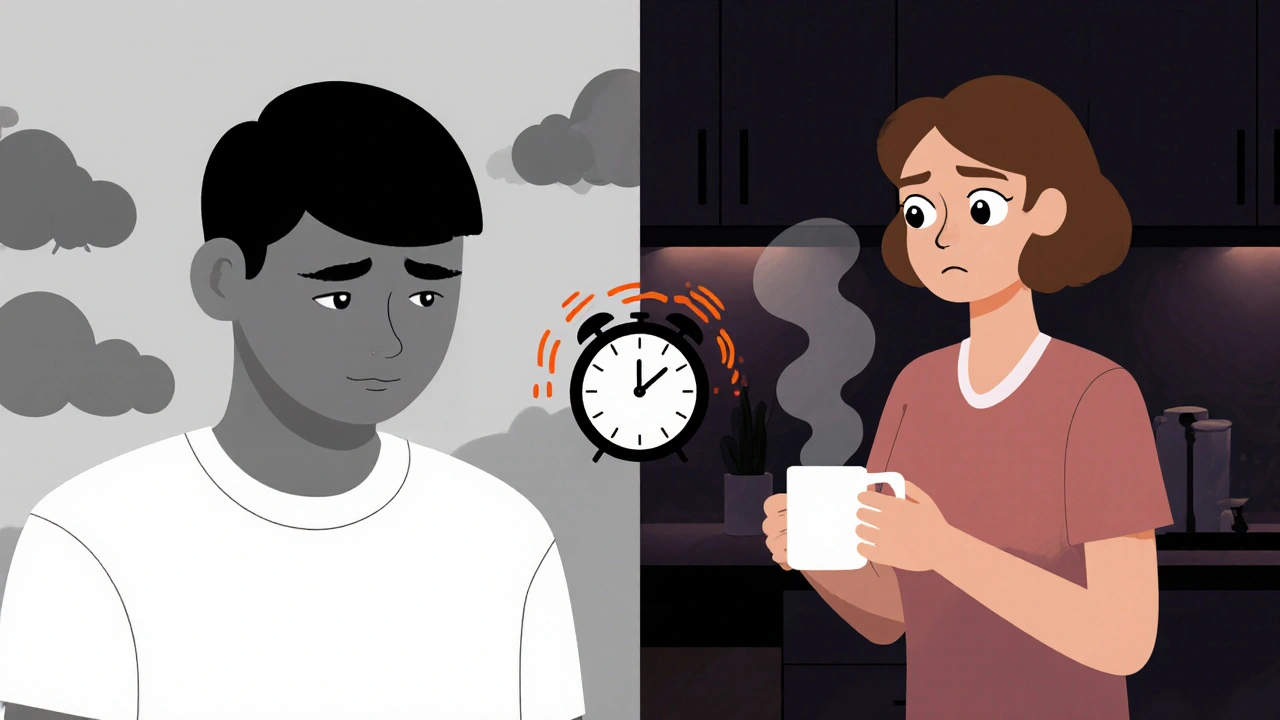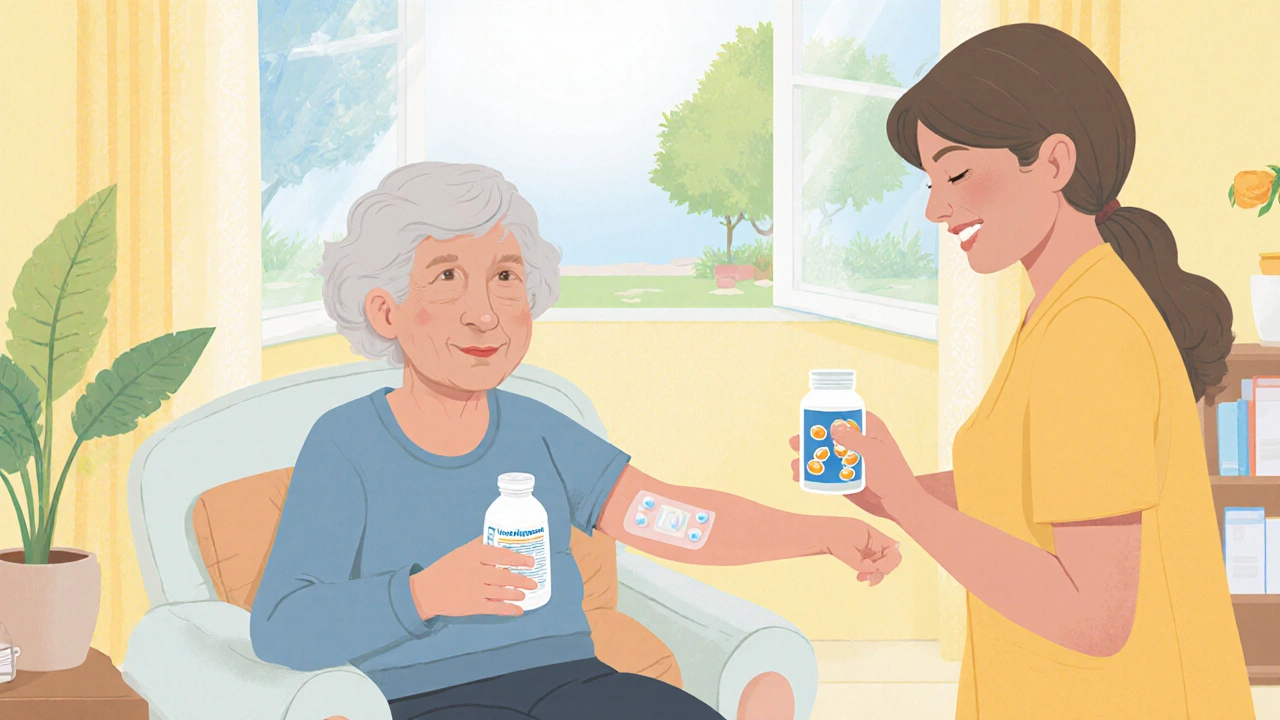When you or a loved one starts Rivastigmine a reversible acetylcholinesterase inhibitor used for Alzheimer’s disease and Parkinson’s disease dementia, the focus often lands on memory scores and daily functioning. Yet the drug’s emotional ripple effects can be just as significant-sometimes even the main reason families reach out for help. Below you’ll find a straightforward look at what those feelings look like, why they happen, and how both patients and caregivers can manage them.
What is Rivastigmine and How Does It Work?
Rivastigmine belongs to the acetylcholinesterase inhibitor class. By blocking the enzyme that breaks down acetylcholine, it boosts the neurotransmitter’s availability in the brain, which can temporarily improve cognition and slow functional decline. The drug is available as oral capsules, a transdermal patch, and an oral solution, giving clinicians flexibility for patients who have swallowing difficulties.
Who Takes Rivastigmine?
The two main populations are people diagnosed with Alzheimer’s disease and those with Parkinson’s disease dementia. In both cases, the disease process reduces cholinergic activity, so enhancing that pathway can help with attention, language, and short‑term memory. Roughly 30‑40% of patients in specialty clinics receive rivastigmine at some point, according to a 2023 multicenter registry.
Physical Side Effects You’ll Hear About First
Before diving into emotions, it’s useful to note the most common physical complaints: nausea, vomiting, loss of appetite, and weight loss. The patch formulation cuts down gastrointestinal upset for many patients, but it can cause skin irritation. These physical reactions often set the stage for emotional shifts because feeling sick or uncomfortable can make anyone irritable.
Emotional Side Effects in Patients
Clinical trials and real‑world studies flag several mood‑related outcomes. About 15‑20% of users report new‑onset depression, while 10% notice heightened anxiety. A 2022 observational study of 652 patients found that those on the patch were less likely to develop severe agitation than those on oral capsules, suggesting steady drug levels matter for mood stability.
- Depression: Often subtle at first-loss of interest in favorite hobbies, low energy, or a “flat” affect.
- Anxiety: Racing thoughts, restlessness, and a persistent sense of worry about the future.
- Apathy: Diminished motivation that can be mistaken for disease progression.
- Agitation or irritability: Short‑tempered responses to minor frustrations, especially during dose adjustments.
These changes aren’t always drug‑induced; the underlying neurodegeneration plays a role too. However, the timing-often a few weeks after dose titration-helps clinicians link the two.
How Caregivers Feel the Impact
When a loved one’s mood swings, the whole household feels it. Caregivers frequently experience caregiver burnout, a mix of emotional exhaustion, depersonalization, and reduced personal accomplishment. A 2024 survey of 1,200 family caregivers showed that 42% rated the emotional toll of medication side effects as “high,” ranking it just behind behavioral disturbances.
- Increased stress due to unpredictable mood shifts.
- Feelings of guilt when they can’t calm a patient’s anxiety.
- Social isolation because caregiving duties limit outside activities.
These pressures can exacerbate the caregiver’s own risk of depression and anxiety, creating a feedback loop that worsens both parties’ well‑being.
Spotting Early Warning Signs
Catch‑the‑signal approaches work better than waiting for a crisis. Below is a quick checklist you can run through each month:
- Has the patient lost interest in previously enjoyed activities?
- Do you notice more frequent tearfulness or expressions of hopelessness?
- Is there a rise in irritability or aggression during routine tasks?
- Are you, as a caregiver, feeling unusually drained, angry, or resentful?
- Have you started missing appointments or neglecting self‑care?
If you tick more than one, it’s time to talk to the prescribing clinician or a mental‑health professional.

Practical Coping Strategies for Patients
Medication tweaks are only part of the solution. Non‑pharmacologic interventions can smooth emotional bumps.
- Structured daily routines: Predictability reduces anxiety.
- Light exercise: Walking or seated tai‑chi for 20 minutes boosts endorphins.
- Music therapy: Familiar songs can lift mood without side effects.
- Psychosocial interventions: Cognitive‑behavioral therapy tailored for dementia has shown modest benefits in a 2021 pilot.
- Support groups: Support groups for dementia patients offer peer connection and shared coping tips.
Any new activity should be introduced gradually, especially if the patient is already feeling uneasy.
Support Strategies for Caregivers
Taking care of yourself isn’t selfish; it’s essential for sustainable caregiving.
- Respite care: Even a few hours a week can reset stress levels.
- Professional counseling: Tele‑therapy options make it easier to fit into a busy day.
- Education sessions: Understanding why rivastigmine may cause mood changes demystifies the experience.
- Peer support: Joining a support group for caregivers provides validation and practical tips.
- Mindfulness and relaxation: Short breathing exercises can lower cortisol during an agitation episode.
Documenting what works-like a simple journal-helps you refine your approach over time.
How Rivastigmine Stacks Up Emotionally Against Donepezil
| Aspect | Rivastigmine | Donepezil |
|---|---|---|
| Depression incidence | 15‑20% (higher with oral capsule) | 10‑12% |
| Anxiety | ≈10% (patch lower) | ≈8% |
| Agitation | Lower with patch; 5‑7% overall | 9‑12% |
| Skin irritation (patch only) | 5‑8% | - |
| Caregiver‑reported stress increase | 42% cite medication mood effects | 31% cite medication mood effects |
The numbers suggest the patch formulation of rivastigmine may be kinder to mood than oral options, and both tend to cause slightly more emotional strain than donepezil. That said, individual response varies, so personal monitoring remains key.
Quick Monitoring Checklist for Home Use
- Track mood daily (simple smiley‑face chart works).
- Note any new anxiety triggers or agitation episodes.
- Record caregiver stress level on a 1‑10 scale each week.
- Review side‑effect log with your doctor every 3 months.
- Adjust dosage only under medical guidance; never stop abruptly.
Having a visual log helps both patient and caregiver see patterns and discuss them objectively with the healthcare team.
Key Takeaways
- Rivastigmine can improve cognition but may also bring depression, anxiety, and agitation.
- Emotional shifts affect caregivers, often leading to burnout.
- Early detection, open communication, and non‑drug coping tools make a big difference.
- Patch formulation tends to be gentler on mood than oral capsules.
- Regular monitoring and support resources keep both patient and caregiver healthier.

Can rivastigmine cause depression?
Yes. Clinical data show that roughly 15‑20% of patients on rivastigmine report new‑onset depressive symptoms, especially during the first month of dose titration. The risk is a bit lower with the transdermal patch.
What’s the difference between the patch and oral capsule for mood?
The patch releases the drug slowly, providing steadier blood levels and generally fewer gastrointestinal and mood‑related side effects. Oral capsules can cause peaks and troughs that sometimes trigger irritability or anxiety.
How can I tell if my loved one’s mood change is the drug or the disease?
Look at timing. Mood shifts that start 2‑4 weeks after a dose change or after starting rivastigmine are more likely medication‑related. If the changes are gradual and parallel disease progression, they’re probably disease‑driven. Discuss observations with the prescribing neurologist.
What non‑drug options help with anxiety caused by rivastigmine?
Regular light exercise, music therapy, mindfulness breathing, and short‑term cognitive‑behavioral therapy tailored for dementia patients have all shown modest anxiety reduction in recent studies.
When should a caregiver seek professional help?
If you score 7 or higher on a 1‑10 stress scale for more than two weeks, or if you notice persistent sadness, insomnia, or physical health decline, it’s time to talk to a mental‑health professional. Early intervention prevents burnout.



Welcome to the discussion, let’s unpack the emotional side‑effects of Rivastigmine together, and remember, every caregiver’s experience is unique, so feel free to share what’s working for you, and what feels overwhelming, we’re all here to learn from each other.